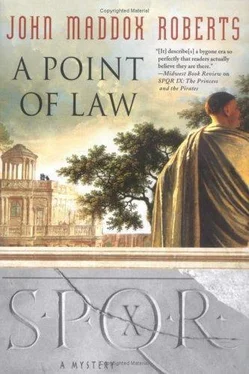John Roberts - A Point of Law
Здесь есть возможность читать онлайн «John Roberts - A Point of Law» весь текст электронной книги совершенно бесплатно (целиком полную версию без сокращений). В некоторых случаях можно слушать аудио, скачать через торрент в формате fb2 и присутствует краткое содержание. Год выпуска: 0101, ISBN: 0101, Издательство: St. Martin, Жанр: Исторический детектив, на английском языке. Описание произведения, (предисловие) а так же отзывы посетителей доступны на портале библиотеки ЛибКат.
- Название:A Point of Law
- Автор:
- Издательство:St. Martin
- Жанр:
- Год:0101
- ISBN:9780312337254
- Рейтинг книги:5 / 5. Голосов: 1
-
Избранное:Добавить в избранное
- Отзывы:
-
Ваша оценка:
- 100
- 1
- 2
- 3
- 4
- 5
A Point of Law: краткое содержание, описание и аннотация
Предлагаем к чтению аннотацию, описание, краткое содержание или предисловие (зависит от того, что написал сам автор книги «A Point of Law»). Если вы не нашли необходимую информацию о книге — напишите в комментариях, мы постараемся отыскать её.
A Point of Law — читать онлайн бесплатно полную книгу (весь текст) целиком
Ниже представлен текст книги, разбитый по страницам. Система сохранения места последней прочитанной страницы, позволяет с удобством читать онлайн бесплатно книгу «A Point of Law», без необходимости каждый раз заново искать на чём Вы остановились. Поставьте закладку, и сможете в любой момент перейти на страницу, на которой закончили чтение.
Интервал:
Закладка:
“You mean like Catilina?” I said. “Some frustrated, would-be dictator currying favor among the malcontents and the dispossessed?”
“I am thinking more of the exiles,” he answered. “Gabinius would dearly love to come back to Rome and resume his career. You had a run-in with him on Cyprus, did you not?”
“Yes, early on,” I told him, “but we patched it up.”
“You are not his lifelong friend though,” Father said, “and no man is your friend where great ambition is concerned. I think we should consider Gabinius as a possibility. What about Curio?”
“The man’s a pauper!” Hortalus protested.
“So was Caesar until a few years ago,” Creticus said. “Curio’s standing for Tribune of the People, he has a slate of proposed legislation that’s as ambitious as anything since the brothers Gracchi-”
“And,” Scipio put in, “he’s suddenly presenting himself as the enemy of the optimates . Just a month ago he was solidly in our camp.”
I could see that my family had been discussing Curio quite a bit already. I barely knew Caius Scribonius Curio, who was a wellborn, high-living young man of little accomplishment, although he was said to be extremely intelligent and a fine speaker.
“If he’s elected tribune,” Father said, “he’ll be in a strong position to push Fulvius’s career. Let’s consider him a possibility.”
It went on like this for some time, one name after another being brought forth for consideration. There were a lot of names to consider, too. A family as politically important as mine had as many enemies as friends. And not everyone at the gathering possessed as logical a brain as mine. Some names were raised simply because the raiser disliked the man, or he was known for some especially unusual vice, or he practiced a suspect religion. Someone even brought up the name of Vatinius, an eccentric senator who was fond of wearing a black toga even when he wasn’t in mourning. It was some sort of Pythagorean practice. Otherwise, the man was harmless.
By midnight we had run through just about all the legal and political possibilities except for assassination. I think that was omitted only because the problem wasn’t quite that serious. I could always stand for election again the next year, annoying though that might be.
“Well,” Hortalus said, lurching to his feet, “I’m off. I am going to the house of Claudius Marcellus, where we shall watch the skies from his excellent garden. All of you take my advice and get some sleep. We really can’t formulate our defense until we know more about this upstart, Flavius. This time tomorrow we will know all we need to about that man.”
“Let me accompany you,” I said. “The streets are black, and the night is moonless. My men brought plenty of torches, and they’re all veterans.”
“A good idea,” Father said. “When you’ve seen our friend to his destination, get some rest and we’ll all meet at dawn on the basilica steps.”
Outside, I got Hermes and my men arranged, some in front of Hortalus’s litter, some behind. Just because the great gangs had been broken up did not mean that the streets of Rome were perfectly safe, especially on a moonless night. My men were armed, discreetly, with weapons beneath their cloaks. So was I.
“Come join us in the litter, Decius,” Hortalus said, as he and Appius Claudius got in. “There’s room for three.”
Nothing loath, I climbed in. At that time it was considered rather effeminate for a man of military age to use a litter. They were supposed to be conveyances for wellborn women, the sick, and the elderly. But I wasn’t about to stumble around in Rome’s filthy, benighted streets if something better was offered. The bearers groaned at the extra weight when they hoisted us.
“Are you going to the house of Claudius Marcellus, too?” I asked Appius Claudius. I knew the two Claudian families were related, but distantly.
“No,” he said, “I’ve been staying as a guest at Quintus’s country villa. Tonight I’ll go on to my own house.”
Hortensius Hortalus had spent most of his time in recent years in his splendid country houses, where he had been developing fish ponds with his friend Marcus Phillipus. The two wrote long books on the subject.
“With country estates like yours,” I said to Hortalus, “I wonder that you bother coming to the City at all.”
“I’m an old Forum politician,” he said. “I just can’t stand to miss an election. Especially not when the issues being debated in the Senate are so crucial to the state. I am long past my days of highest influence, but I flatter myself that my voice is still listened to.”
“Rome ignores your wisdom at her peril,” said Appius.
“Which issues concern you so?” I asked.
“Why the growing insolence of Caesar, of course! Forgive me, Decius, but you’ve been away from the City too long. Did you know that Caesar this year petitioned to stand for consul while keeping his army and his provinces? Unheard of! Might as well crown the bugger king and be done with it.”
“Caesar has been courting that man Curio we just spoke of,” Appius put in. “I think he’s trying to bribe every man standing for next year’s tribuneship: Pansa and Caelius that I know of, probably the others. But he’ll win over Curio for certain.”
“How do you know?” I asked.
“The usual. The man’s terrifically debt-ridden, and Caesar will pay off his debts. Has it occurred to anyone that the root of most of our political disorder is not the generals who go out and accumulate loot but the young, wellborn wastrels who accumulate debt instead? There is nothing more dangerous to the public good than a senator or young man of senatorial family made desperate by crushing debt. They can be bought by any politician with a heavy purse.”
“That is very true,” Hortalus said, nodding.
“Next year, if I succeed in being elected censor-”
“The censorship is yours for the asking, Appius Claudius,” I assured him.
“Hear, hear,” Hortalus affirmed.
“I thank you both. Anyway, I intend to use that office to purge the Senate of its worst elements, starting with all those disgraceful debtors.”
“I hope,” Hortalus said, “that you get a colleague who will cooperate with you. My own censorship was ideal because I had the elder Decius as colleague. But poor Crassus could do nothing because his colleague kept overruling every decision he made. He had to quit before even finishing the census or performing the lustrum.”
“Who is most likely to win the other censorship?” I asked. “As Quintus Hortensius has observed, I’ve been out of touch.”
“I am hoping for the elder Cassius,” Appius said, “but it’s more likely to be Calpurnius Piso. If so, I can work with him. He’s one of those who tries not to declare for Caesar or Pompey, but they’re a vanishing breed. It’s a disgrace that Romans of rank have to be seen as supporters of one would-be tyrant or the other, but one must face the situation realistically.”
By this time we were near the house of Marcellus. I got out of the litter, took my leave of the two men, and proceeded to walk the short distance to my own home with Hermes and the rest of my men. They had spent the evening loitering around Father’s house, doubtless talking politics like the rest of Rome.
“Did you get anything accomplished?” Hermes wanted to know.
“Just a lot of talk,” I told him. Around us the others held torches aloft and peered into dark alleys, their faces truculent, hands resting on hilts.
“Same here. The mood in the city’s strange since we got back. The quiet is unnatural. Everybody is waiting for something to happen. People are seeing omens everywhere. I just heard about a two-headed calf born near Arpinum, and a hawk killed one of Juno’s geese this morning.”
Читать дальшеИнтервал:
Закладка:
Похожие книги на «A Point of Law»
Представляем Вашему вниманию похожие книги на «A Point of Law» списком для выбора. Мы отобрали схожую по названию и смыслу литературу в надежде предоставить читателям больше вариантов отыскать новые, интересные, ещё непрочитанные произведения.
Обсуждение, отзывы о книге «A Point of Law» и просто собственные мнения читателей. Оставьте ваши комментарии, напишите, что Вы думаете о произведении, его смысле или главных героях. Укажите что конкретно понравилось, а что нет, и почему Вы так считаете.









